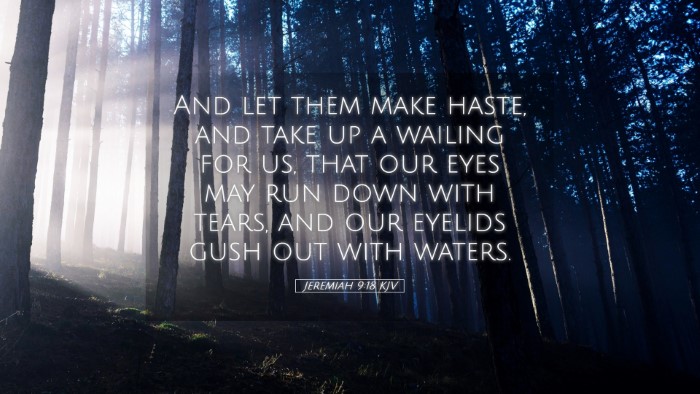Commentary on Jeremiah 9:18
Introduction
Jeremiah 9:18 serves as a poignant expression of lamentation and emphasizes the deep yearning for genuine repentance among the people of Israel during a tumultuous time in their history. As we explore this verse through the insights of renowned biblical commentators like Matthew Henry, Albert Barnes, and Adam Clarke, we aim to shed light on the theological implications, historical context, and practical applications of this verse for pastors, students, theologians, and Bible scholars.
Verse Context
The context of Jeremiah 9 highlights the prophet’s sorrow over the moral decay and spiritual blindness of his people. This chapter is characterized by a series of lamentations that express God's displeasure due to the sinfulness prevalent among the Israelites. As Jeremiah intercedes on behalf of his nation, verse 18 stands out as a call for the women mourners to arise and share in the sorrow for the coming destruction and spiritual desolation.
Verse Analysis
The Text of Jeremiah 9:18
The verse reads: "And let them make haste, and take up a wailing for us, that our eyes may run down with tears, and our eyelids gush out with waters." This cry for urgent mourning underscores the seriousness of the impending judgment and the need for collective repentance.
Insights from Matthew Henry
In his commentary, Matthew Henry emphasizes the role of mourning as a catalyst for genuine repentance. He notes that the wailing women represent the gravity of the situation and act as agents of emotional expression in a time where sensitivity to sinfulness is critical. Henry draws attention to the imagery of eyes flowing with tears, symbolizing not just sorrow but a deep-hearted acknowledgment of the severity of Israel’s condition. He suggests that the absence of such mourning reflects a troubling apathy towards God’s warnings and a callousness that can have dire consequences.
Insights from Albert Barnes
Albert Barnes expands upon this mourning motif by associating it with the pervasive crisis within Israel. He highlights that in ancient Near Eastern culture, wailing women played a significant role in public expressions of grief, often marking the occasion of death and destruction. Barnes interprets this verse as a summons to awaken the nation from their spiritual slumber, using the imagery of tears to represent the profound consequences of sin. He articulates that earnest lamentation could pave the way for revival and restoration, necessitating both acknowledgment of guilt and a sincere return to the Lord.
Insights from Adam Clarke
Adam Clarke provides a nuanced reflection on the urgency conveyed in this verse. He notes that the phrase "make haste" implies an immediacy in addressing the situation at hand. Clarke stresses that the depth of sorrow and repentance conveyed through the act of wailing symbolizes a heart that is truly broken over sin. He posits that this corporate mourning serves as a necessary precursor for any hope of divine mercy, underscoring the belief that true repentance must be coupled with an earnestness that is evident to God.
Theological Implications
The theological implications of Jeremiah 9:18 are profound. The verse serves as a reminder of the importance of communal lamentation in the face of sin and judgment. It invites reflection on:
- The Nature of Sin: Sin is not merely a personal failing but a communal crisis that necessitates collective acknowledgment and repentance.
- The Role of Mourning: Mourning can be a powerful tool in the process of repentance, drawing attention to the human condition's fragility and the need for divine grace.
- God’s Call for Repentance: This verse illustrates the idea that God desires brokenness over contrition—true repentance that manifests visibly through sorrow and humility.
Practical Applications
For pastors and church leaders today, Jeremiah 9:18 offers several practical applications:
- Encouragement to Engage in Lament: Leaders can create space within congregational settings for expressions of sorrow over sin, fostering an environment where genuine repentance can flourish.
- Teaching on Corporate Responsibility: The necessity for communities to address communal sinfulness helps in shaping a shared vision of revival that is collective rather than individualistic.
- Promoting Sensitivity to Sin: Emphasizing the severity of sin can urge congregations towards a deeper understanding of God’s holiness and their need for grace.
Conclusion
Jeremiah 9:18 poignantly captures the essence of lamentation in the face of impending judgment, serving as both a warning and a call for repentance. The insights derived from esteemed commentators illuminate the depth of emotional and spiritual engagement necessary in response to sin. For modern readers—whether scholars, pastors, or laypeople—this text beckons a return to heartfelt mourning over personal and communal failings, underlining a necessary posture for genuine revival and restoration. In embracing the lessons of Jeremiah 9:18, we find a pathway to deeper communion with God and a firmer stance against the tide of apathy that so frequently seeks to engulf the faithful.


